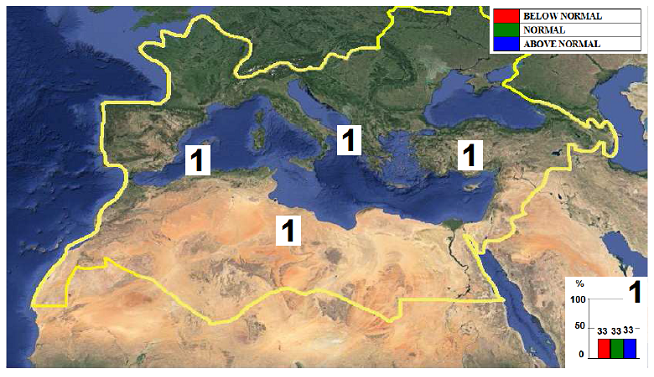Third Session of the MEDITERRANEAN CLIMATE OUTLOOK FORUM (MedCOF-3)
Antalya, Turkey, November 17-18, 2014
This prediction is based on output from dynamical models, statistical models and known teleconnections of large-scale climate features.
Throughout the summer conditions in the equatorial Pacific have been ENSO neutral; recently SSTs in the region have increased close to El Niño thresholds and the atmosphere has shown weak response reflected in the values of the SOI index, though not all indicators are typical of an El Niño event, especially in the western part of the basin. Forecast models suggest current conditions will either persist or strengthen over the next three months. SST patterns in the North Atlantic may offer some predictability for this winter, especially due to the anomalously warm water in the tropical region. The QBO is currently and will remain in its negative phase during the next few months.
Since the large scale drivers are currently relatively weak, and their typical individual influences are in opposition, predictability for the whole season is low at present. Sub-seasonal variations, not predictable a long time in advance, may dominate at times, so regular updates to the forecast are strongly recommended. In addition, regional factors (for example SSTs in the smaller basins of the region) may shape local variability to a higher degree than usual.
The maps show the probabilistic consensus forecast for tercile categories of anomalies for seasonal mean temperature and precipitation, relative to the period 1981-2010. Due to the climate warming trend anomalies are affected by the selected reference period.

Figure 1. Graphical presentation of the 2014/15 winter temperature outlook
Although for most of the MedCOF domain the uncertainty for the temperature prediction is high, there is a tendency for the upper tercile over most of the domain being this preference more marked over the Mediterranean Sea and the Northern part of the domain (region 2).

Figure 2. Graphical presentation of the 2014/15 winter precipitation outlook
Precipitation in the whole MedCOF domain shows no preference for any climate defined categories.
Note that it is necessary to express seasonal forecasts in terms of probability due to inherent uncertainty. Any further advice on the forecast signals, smaller scales, shorter-range updates and warnings will be available throughout the winter from the National Meteorological Services, along with details on the methodology and skill of long-range predictions.
* The graphical representation of climate outlook in this statement is only for guidance purposes, and does not imply any opinion whatsoever concerning the legal status of any country, territory, city or area or of its authorities, or concerning the delimitation of its frontiers or boundaries.
Third Session of the MEDITERRANEAN CLIMATE OUTLOOK FORUM (MedCOF-3)
Antalya, Turkey, November 17-18, 2014
| 17 November 2014 (Monday) | |
|---|---|
| 09:00-09:30 | Registration |
| 09:30-10:30 |
Opening
|
| 10:30-11:00 | COFFEE BREAK & GROUP PHOTO |
| 10:30-12:30 |
Session I - Climate monitoring (Chair: J.- P. Ceron)
|
| 12:30-13:30 | LUNCH BREAK |
| 13:30-15:30 |
Session II - Production of large scale climate outlook for winter (DJF) 2014-2015 (I) (Chair: A. Kamga)
|
| 15:30-16:00 | COFFEE BREAK |
| 16:00-18:30 |
Session II - Production of large scale climate outlook for winter (DJF) 2014-2015 (I) (cont.) (Chair: B. Bijelic)
|
| 18 November 2014 (Tuesday) | |
| 09:00-11:00 |
Session III - Production of large scale climate outlook for winter (DJF) 2014-2015 (II) (Chair: A. Brookshaw)
|
| 11:00-11:30 | COFFEE BREAK |
| 11:30-13:00 |
Session III - Production of large scale climate outlook for winter (DJF) 2014-2015 (II) (Chair: A. Brookshaw) |
| 13:00-14:30 | LUNCH BREAK |
| 14:30-16:00 |
Session IV - Discussion on MedCOF matters (Chair: E. Rodriguez)
|
| 16:00-16:30 | COFFEE BREAK |
| 16:30-18:00 |
Session IV - Discussion on MedCOF matters (cont.) (Chair: E. Rodriguez) |
| 18:00-18:30 |
Session V - Conclusions and Recommendations |


